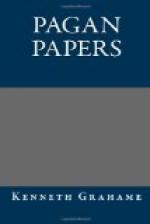So they left us for their pleasure; and in due time, one by one —
But I will not be morose about them; they had honestly earned their success, and we all honestly rejoiced at it, and do so still.
When old Pan was dead and Apollo’s bow broken, there were many faithful pagans who would worship at no new shrines, but went out to the hills and caves, truer to the old gods in their discrowned desolation than in their pomp and power. Even so were we left behind, a remnant of the faithful. We had never expected to become great in art or song; it was the life itself that we loved; that was our end — not, as with them, the means to an end.
We aimed at no glory, no lovers of glory
we;
Give us the glory of going on and still
to be.
Unfortunately, going on was no longer possible; the old order had changed, and we could only patch up our broken lives as best might be.
Fothergill said that he, for one, would have no more of it. The past was dead, and he wasn’t going to try to revive it. Henceforth he, too, would be dead to Bloomsbury. Our forefathers, speaking of a man’s death, said ``he changed his life.’’ This is how Fothergill changed his life and died to Bloomsbury. One morning he made his way to the Whitechapel Road, and there he bought a barrow. The Whitechapel barrows are of all sizes, from the barrow wheeled about by a boy with half a dozen heads of cabbages to barrows drawn by a tall pony, such as on Sundays take the members of a club to Epping Forest. They are all precisely the same in plan and construction, only in the larger sizes the handles develop or evolve into shafts; and they are equally suitable, according to size, for the vending of whelks, for a hot-potato can, a piano organ, or for the conveyance of a cheery and numerous party to the Derby. Fothergill bought a medium sized ``developed’’ one, and also a donkey to fit; he had it painted white, picked out with green — the barrow, not the donkey — and when his arrangements were complete, stabled the whole for the night in Bloomsbury. The following morning, before the early red had quite faded from the sky, the exodus took place, those of us who were left being assembled to drink a parting whisky-and-milk in sad and solemn silence. Fothergill turned down Oxford Street, sitting on the shaft with a short clay in his mouth, and disappeared from our sight, heading west at a leisurely pace. So he passed out of our lives by way of the Bayswater Road.
They must have wandered far and seen many things, he and his donkey, from the fitful fragments of news that now and again reached us. It seems that eventually, his style of living being economical, he was enabled to put down his donkey and barrow, and set up a cart and a mare — no fashionable gipsy-cart, a sort of houseboat on wheels, but a light and serviceable cart, with a moveable tilt, constructed on his own designs. This allowed him to take along with him a few canvases and other artists’ materials; soda-water, whisky, and such like necessaries; and even to ask a friend from town for a day or two, if he wanted to.




